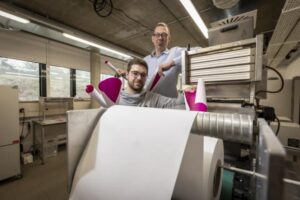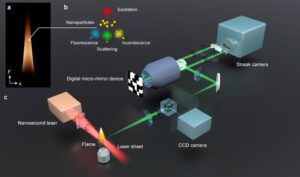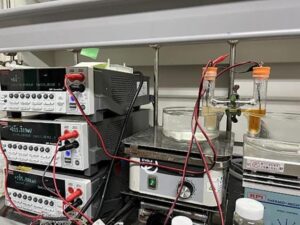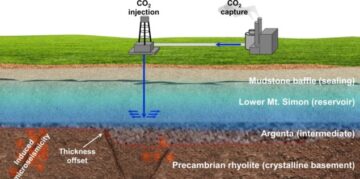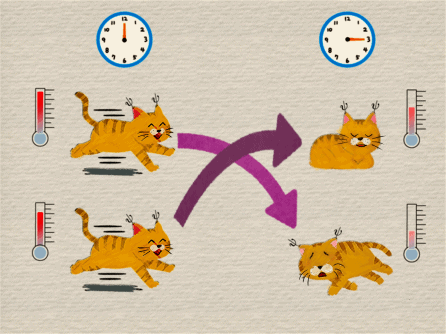
When the Tanzanian schoolboy Erasto Mpemba asked a visiting lecturer why hot water freezes faster than cold, he could not have guessed that his observation – made while making ice-cream – would draw the attention of some of the world’s greatest physicists. The phenomenon is now known as the Mpemba effect, but variants of it have baffled philosophers and physicists since the days of Aristotle, and it has subsequently been observed in other contexts, including magnetic systems that display colossal magnetoresistance and colloidal beads falling through the path of optical tweezers.
A trio of researchers in Japan has now added to this list by demonstrating the Mpemba effect theoretically in a simple quantum system. The result may point towards ways of making quantum computers more efficient, though team member Hisao Hayakawa cautions that it is early days. “So far, we don’t have so many experiments on the quantum Mpemba effect,” he tells Physics World.
Quantum definition
The nature of the Mpemba effect has been much debated, with questions arising not only over its mechanisms and its required initial conditions, but even its definition. Does the speed-up lie in the time taken for freezing (or some other phase change) to begin? Does the phase change need to be complete? Or is the important factor merely the time the system takes to sink below the temperature at which the phase change is expected?
In the latest work, Hayakawa and his Kyoto University colleague Amit Kumar Chatterjee, together with Satoshi Takada of the Tokyo University of Agriculture and Technology, defined the Mpemba effect in terms of a crossing in the quantity they were monitoring. In water, this crossing would occur when the temperature of the hotter liquid, which is cooling faster, “crosses” that of the colder liquid, making the formerly hotter liquid into the colder one.
For Chatterjee, Hayakawa and Takada, this crossing took place in a modelled system composed of a quantum dot connected to two reservoirs acting as heat sinks (a role played by the freezer in the original ice-cream-based Mpemba effect). The reservoirs start off at the same temperature, with the difference in their starting conditions supplied by the chemical potential of the two reservoirs, which can be equal (indicating equilibrium) or not. The trio then characterized the state of the quantum dot, observing whether it had two electrons with opposing quantum spins, a single electron with either an up or down spin, or no electrons at all. Together, these possible states defined a parameter they could track as the system relaxes, or achieves equilibrium – the equivalent of the ice-cream cooling to the temperature of the freezer it is in.
As the quantum dot relaxes, Hayakawa explains that its dynamics – that is, how its state evolves – “remembers the initial state”. In other words, the relaxation is faster when the reservoirs are not initially in equilibrium, and the tracked parameter at equilibrium starting conditions crosses that of its non-equilibrium counterpart – the Mpemba effect in action.
The role of metastability
One of the complicating factors in the original Mpemba effect is that water is a complex substance that can exist in metastable states. Think of these states as being like a chair in a room occupied by an exhausted person. Upon seeing the chair, the exhausted person will likely flop into it, and only later lie down on the floor to fully relax. If the chair was not there, however, the exhausted person would probably lie down straight away and reach a fully relaxed state much quicker.
A lot of emphasis has been placed on these metastable states, and many studies have concluded that it is this slowest relaxation route that drives the Mpemba effect. However, the quantum dot system has no metastable states. What is more, the team’s analysis suggested it was the combined role of the faster relaxation routes that determined the effect – a great surprise.
Chatterjee tells Physics World that while metastability may be “sufficient in some systems”, their simplified quantum dot system reveals “another kind of sufficient conditions”. He suggests that studies to date have not yet pinned down conditions or requirements that are universally applicable, although that may come. “I think the whole community is trying to find different mechanisms to see the quantum Mpemba effect,” he says.
Things get cool
Keen to see if they could demonstrate the Mpemba effect in a way that more closely resembles the original, the researchers then defined a temperature for their system. Since this quantum system lacks the trillions of molecules with statistically meaningful ensemble characteristics that give rise to temperature in the classical world, Hayakawa notes that “the definition of temperature is very subtle”. In fact, there are several ways of translating quantum states into temperature, each of which produces parameters with their own nuanced behaviour.
In this case, the researchers chose to use a temperature defined by the ratio of changes – the partial derivative – in energy and a quantity called von Neumann entropy. Entropy is another slippery quantity for quantum systems, but the von Neumann entropy is quite conventionally related to the possible states of the quantum dot. Using this definition, the team was also able to demonstrate the Mpemba effect.
John Bechhoefer, a physicist at Simon Fraser University in Canada who led an experiment demonstrating the Mpemba effect in a colloid using optical tweezers in 2020, notes that there has been some previous work on “quantum Mpemba effects,” and the Kyoto-Tokyo team acknowledge this. However, Bechhoefer adds that these earlier studies focused on different types of relaxation to equilibrium – for example in magnetization. “It is very satisfying to see that the ‘original’ effect is also predicted in fairly simple quantum systems, and I hope that this paper inspires experimental searches in real-world quantum systems,” Bechhoefer tells Physics World.

Experiments pin down conditions that make hot water freeze before cold
Chatterjee, Hayakawa and Takada now plan to look at possible connections between their findings and quantum speed limits, which stem from the uncertainty principle and place restrictions on how fast a quantum system can change from one state to another. Though no-one has yet pinned down this connection, both quantum speed limits and relaxation rates may impact the operation of quantum computers, which need to reach their relaxed states quickly to process information in a timely manner.
The results are reported in Physical Review Letters.
- SEO Powered Content & PR Distribution. Get Amplified Today.
- PlatoData.Network Vertical Generative Ai. Empower Yourself. Access Here.
- PlatoAiStream. Web3 Intelligence. Knowledge Amplified. Access Here.
- PlatoESG. Automotive / EVs, Carbon, CleanTech, Energy, Environment, Solar, Waste Management. Access Here.
- PlatoHealth. Biotech and Clinical Trials Intelligence. Access Here.
- ChartPrime. Elevate your Trading Game with ChartPrime. Access Here.
- BlockOffsets. Modernizing Environmental Offset Ownership. Access Here.
- Source: https://physicsworld.com/a/quantum-mpemba-effect-hints-at-faster-quantum-computers/
- :has
- :is
- :not
- $UP
- 2020
- 7
- a
- Able
- About
- AC
- Achieves
- acknowledge
- acting
- Action
- added
- Adds
- After
- agriculture
- All
- also
- Although
- an
- analysis
- and
- Another
- applicable
- ARE
- AS
- At
- attention
- away
- BE
- been
- before
- begin
- being
- below
- between
- both
- but
- by
- called
- CAN
- Canada
- cartoon
- case
- CAT
- Cats
- cautions
- Chair
- change
- Changes
- characteristics
- characterized
- chemical
- chose
- Clock
- closely
- cold
- colleague
- combined
- come
- community
- complete
- complex
- composed
- computers
- concluded
- conditions
- connected
- connection
- Connections
- contexts
- could
- Counterpart
- Current
- Date
- Days
- defined
- definition
- demonstrate
- demonstrating
- derivative
- determined
- difference
- different
- Display
- does
- Dont
- DOT
- down
- draw
- drives
- dynamics
- each
- Earlier
- Early
- effect
- effects
- efficient
- either
- electrons
- elements
- emphasis
- energetic
- energy
- equal
- Equilibrium
- Equivalent
- Even
- evolves
- example
- exist
- expected
- experience
- experiment
- experimental
- experiments
- Explains
- fact
- factor
- factors
- fairly
- Falling
- far
- FAST
- faster
- Find
- findings
- Floor
- Flowing
- focused
- For
- formerly
- Freeze
- Freezing
- from
- full
- fully
- get
- Give
- great
- greatest
- guessed
- had
- Have
- he
- here
- High
- hints
- his
- hope
- HOT
- How
- However
- HTML
- http
- HTTPS
- i
- if
- image
- Impact
- important
- in
- In other
- Including
- information
- ING
- initial
- initially
- inspires
- into
- issue
- IT
- ITS
- Japan
- jpg
- Kind
- kumar
- laser
- later
- latest
- Led
- less
- lie
- like
- likely
- limits
- Liquid
- List
- Look
- Lot
- made
- make
- Making
- man
- manner
- many
- max-width
- May..
- meaningful
- mechanisms
- member
- merely
- metastable
- monitoring
- more
- more efficient
- much
- Nature
- Need
- no
- Notes
- now
- of
- off
- on
- ONE
- only
- operation
- or
- original
- Other
- over
- own
- Paper
- parameter
- parameters
- path
- period
- person
- phase
- phenomenon
- PHP
- Physics
- Physics World
- Place
- plan
- plato
- Plato Data Intelligence
- PlatoData
- played
- Point
- possible
- potential
- predicted
- previous
- principle
- probably
- process
- produces
- quantity
- Quantum
- quantum computers
- Quantum dot
- Quantum dots
- quantum systems
- Questions
- quicker
- quickly
- Rates
- ratio
- reach
- real world
- related
- Relax
- relaxation
- relaxed
- Reported
- represented
- required
- Requirements
- researchers
- resembles
- restrictions
- result
- Results
- Reveals
- review
- Rise
- Role
- Room
- Route
- routes
- Safety
- same
- says
- searches
- see
- seeing
- several
- Simon
- Simple
- simplified
- since
- single
- slightly different
- So
- some
- somewhat
- speed
- Spin
- spins
- start
- Starting
- State
- States
- steady
- Stem
- straight
- studies
- Subsequently
- substance
- sufficient
- Suggests
- supplied
- surprise
- system
- Systems
- taken
- takes
- team
- Technology
- tells
- terms
- than
- that
- The
- The State
- their
- then
- There.
- These
- they
- think
- this
- though?
- Through
- thumbnail
- time
- timely
- to
- together
- tokyo
- took
- towards
- track
- trillions
- trio
- true
- trying
- two
- types
- Uncertainty
- universally
- university
- upon
- use
- using
- very
- von
- was
- Water
- Way..
- ways
- we
- were
- What
- What is
- when
- whether
- which
- while
- WHO
- whole
- why
- will
- with
- words
- Work
- world
- world’s
- would
- yet
- zephyrnet


